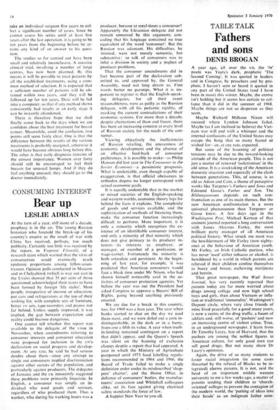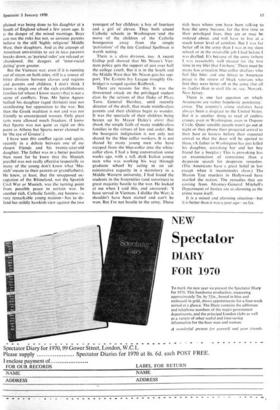TABLE TALK
Fathers and sons
DENIS BROGAN
A year ago, all over the us, the 'in' poem was Yeats's dark, prophetic 'The Second Coming'. It was quoted in leaders and in Congress, by preachers and by pro- phets. I haven't seen or heard it quoted in any part of the United States (and I have been in most) this winter. Maybe, the centre isn't holding-but it seems less certain to col- lapse than it did in the summer of 1968. Maybe things are not so desperate as they seem.
Maybe Richard Milhous Nixon will succeed where Lyndon Johnson failed. Maybe (as I am inclined to believe) the Viet- nam war will end with a whimper and the internal confusions of the United States may escape the bang that so many feared or wished for—or, at any rate, expected.
But some of the lessening of political tensions may be due to the inward-looking attitude of the American people. This is not just a matter of renewed 'isolationism' in the old sense. It is a stocktaking of the American domestic situation and especially of the clash between generations. This, of course, is as old as Adam and Cain, a theme of perceptive works like Turgenev's Fathers and Sons and Edmund Gosse's Father and Son. The Bildungsroman depends on such con- frontation as one of its main themes. But the new American confrontation is a more universal phenomenon than Turgenev or Gosse knew. A few days ago in the Washington Post, Michael Kernan of that eminent journal reported a long conversation with James Aloysius Farley, the most brilliant party manager of all American political history. What struck me most was the bewilderment of Mr Farley (now eighty- one) at the behaviour of American youth. Mr Farley, an Irish Catholic puritan, who has never 'used' either tobacco or alcohol, is bewildered by a world in which parents are relieved if their children confine themselves to baccy and booze; eschewing marijuana and heroin.
That great newspaper, the Wall Street Journal, has very recently reported that parents today are far more worried about drugs among college and now high school boys and girls, than about Vietnam or infla- tion or traditional 'immorality'. Washington's Dupont circle, where very close friends of mine lived peacefully for a good many years, is now a centre of the drug traffic, a haunt of addicts and, still worse, of 'pushers' and now an increasing centre of violent crime. True, in an underground newspaper, I learn from Dr Timothy Leary, late of Harvard, that the pushers are among the noblest figures in American culture, for only good men can sell good drugs. But not many share Dr Leary's optimism.
Again, the drive of so many students to foster racial integration (in some cases thwarted by the refusal of Blacks to be in- tegrated) alarms parents. It is not, said the head of an important middle western , university to me a few weeks ago, a matter of parents sending their children to 'church- oriented' colleges to prevent the contagion of the modern world, the 'putting of ideas into their heads' as an indignant father com- plained was being done to his daughter at a South of England school a few years ago. It is the danger of the mixed marriage. Boys can run the risks but not, so anxious parents believe in the still 'highly religious' Middle West, their daughters. And as the attempt of American universities to act in loco parentis breaks down, as 'parietal rules' are relaxed or abandoned, the dangers of 'inter-racial dating' grow greater.
But the Vietnam war, even if it is running out of steam on both sides. still is a source of bitter division between classes and regions and parents and children. I don't think I know a single one of the rich establishment families (of whom I know many) that is not .a scene of conflicts. True, . Mr Spiro Agnew bullied his daughter (aged thirteen) into not manifesting her opposition to the war. But then the Greek tradition is not and was not friendly to emancipated women. Only great tarts were allowed much freedom. (I know that Sparta was not quite as rigid on this point as Athens but Sparta never claimed to be 'the eye of Greece'.)
I have seen this conflict again and again, recently in a debate between one of my closest friends and his twenty-year-old daughter. The father was in a better position than most for he knew that the Munich parallel was not really effective (especially as many of the young don't know what 'Mu- nich' means to their parents or grandfathers). He knew, at least, that the unopposed oc- cupation of the Rhineland. not the Spanish Civil War or Munich, was the turning point from possible peace to certain war. In another rich, Catholic family, my hostess—a very remarkable young matron—has to de- fend her mildly hawkish view against the two youngest of her children; a boy of fourteen and a girl of eleven. They both attend Catholic schools in Washington andthe move of the children of the Catholic bourgeoisie away from the simple `patriotism' of the-late Cardinal Spellman is worth noting.
There is a class division, too. A recent Gallup poll showed that Mr Nixon's Viet- nam policy gets the support of just over half the college youth. But it is in the South and the Middle West that Mr Nixon gets his sup- port. The Eastern Ivy League (roughly Ox- bridge) is ranged against Redbrick.
There are reasons for this. It was the threatened attack on the privileged student class by the actions of that Duke of Plaza Toro, General Hershey, until recently director of the draft, that made middle-class parents and their children begin to wonder. It was the spectacle of their children being beaten up by Mayor Daley's sbirri that shook the simple faith of many middle-class families in the virtues of law and order. But the bourgeois indignation is not only not shared by the blue collar workers. It is not shared by many young men who have escaped from the blue-collar into the white- collar class. I had a long conversation some weeks ago, with a tall, dark Italian young man who was working his way through graduate school by acting in an ad- ministrative capacity in a dormitory in a Middle Western university. I had found the students in the fraternities (and sororities) in great majority hostile to the war. He looked at me when I said this, and answered: 'I have served in Vietnam. I dislike the War; it shouldn't have been started and can't be won. But I'm not hostile to the army. Those rich boys whom you have been talking to hate the army because. for the first time in their privileged lives, they are or may be ordered about, and will have to live at a much lower level of comfort. But I was far better off in the army than I was in my slum school or in the miserable job I had before I was drafted. It's because of the army (where I was reasonably well treated for the first time in my life) that I'm here.' There must be many less articulate blue-collar draftees who feel like him; and one threat to American peace is the return of black veterans who find they were better off in the army (for all its faults) than in civil life in. say. Newark, New Jersey.
There is one last question on which Americans are rather hopelessly pondering: crime. The country's crime statistics have always been a disgrace to the United States. But it is another thing to read of endless crimes, even in Washington. even in Dupont Circle. Quite sensible people won't go out at night or they phone their projected arrival to their host or hostess before their expected arrival so that the door will be opened to them. (A father in Washington has just killed his daughter, mistaking her and her boy friend for a burglar.) This is provoking less an examination of conscience than a desperate search for desperate remedies. (The Americans have a great belief in law except when it incommodes them.) The Sharon Tate murders in Hollywood have startled the nation. The remedies that are coming from Attorney-General Mitchell's Department of Justice are as alarming as the crime wave itself.
It is a mixed and alarming situation—but it is better than it was a year ago—so far.















































 Previous page
Previous page